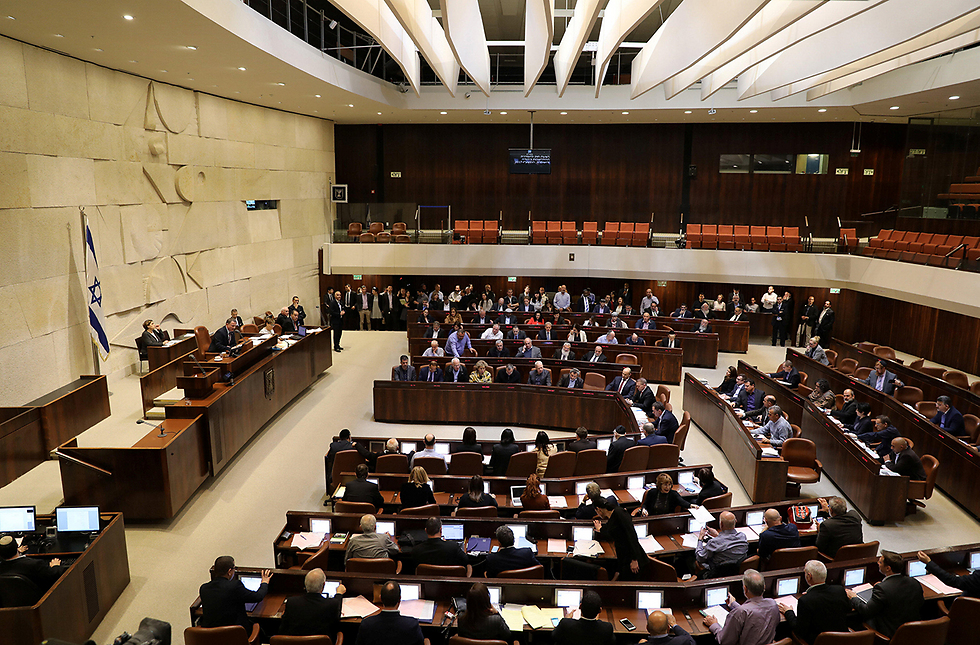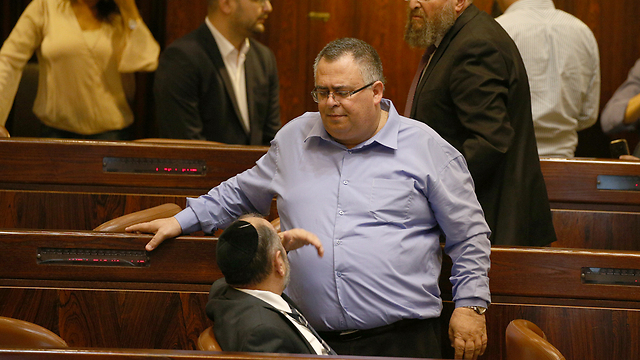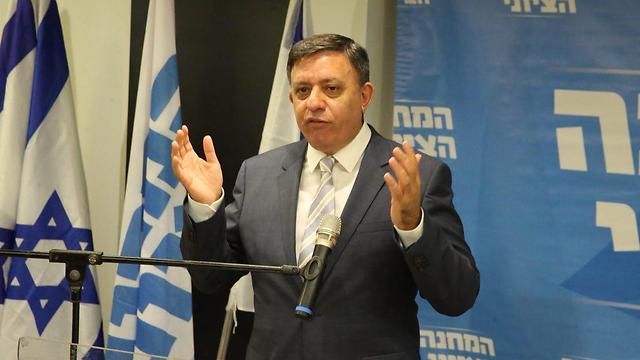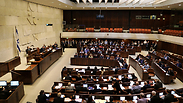
Knesset to begin its winter session Monday
Knesset to begin winter session Monday with several controversial items on agenda, including bill forbidding investigations into sitting PM, bill blocking High Court from striking down Knesset laws and bill cementing Jewish people's claim to self-determination in Israel as unique assertion.
The 20th Knesset's winter session will begin Monday, with several potentially combustible items on the docket, not least of which are Prime Minister Benjamin Netanyahu's ongoing investigations, several controversial bills, a new and combative chairman for the house's largest opposition party and some new faces, replacing long-standing MKs who have resigned.
One of the more explosive bills to be brought before parliament in the coming session is the proposed law by MK David Amsalem (Likud) according to which it will not be possible for police to investigate a sitting prime minister, starting the next term.
The bill is based on the so-called "French law" and will only allow investigating a prime minister during their term in office for serious felonies.
As mentioned above, the bill—should it pass—will only take effect with the next government's term, meaning that should Netanyahu strategically call for new elections and then win, no new investigations would be opened against him, though the ones currently pending would still continue.
Some within the coalition claim this bill will be shot down before ever coming to a vote, while others are of the opinion that with certain modifications and adjustments, such as setting a two-term limit, Amsalem's proposition may have a fighting chance.
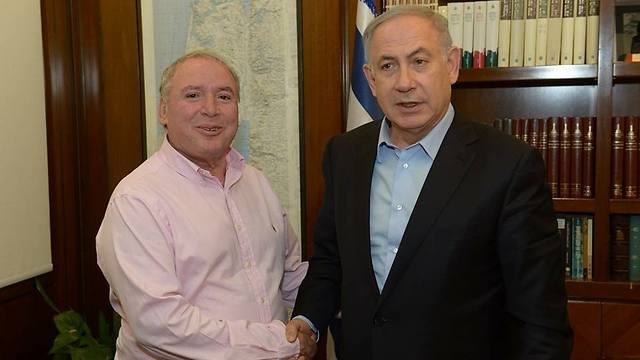
The prolific MK Amsalem has another proposed bill in the works for the coming session, which aims to prevent the police from recommending whether to indict a suspect or not to the State Attorney's Office. Despite the fact that Police Commissioner Roni Alsheikh previously supported the notion, at present, due to several ongoing investigations into alleged wrongdoing by Netanyahu, Amsalem's bill is considered defiant.
Another bill up this session involves Minister of Justice Ayelet Shaked and Minister of Education Naftali Bennett's efforts to finish Israel's constitution. If approved, the bill would, among other changes, bar the High Court of Justice from interfering with Knesset legislation, effectively stemming judicial review.
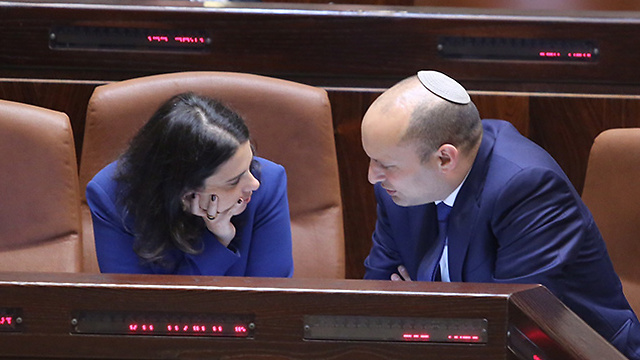
Bennett and Shaked's stated goal is to restore "equilibrium" to the three branches of government. To that end, they plan to bring to a vote a bill titled "Basic Law: Legislation", which they say will fill the thus-far absent governability portion of the Israeli constitution, complementing the three others Basic Laws regarding the Knesset, the government and the judiciary branches.
The proposed Basic Law: Legislation will include a notwithstanding clause, regulating situations in which the High Court strikes down a law and enabling the Knesset to reenact it, under certain provisos.
Another article of the proposed Basic Law would determine the unique manner in which further Basic Laws may be enacted and the fact that they will not be open to judicial review.
The two Bayit Yehudi MKs' intricate initiative is expected to rouse a great deal of pushback from other members of the coalition, and specifically from Minister of Finance Moshe Kahlon, who has persistently refused to approve any legislative initiatives that go against the High Court.
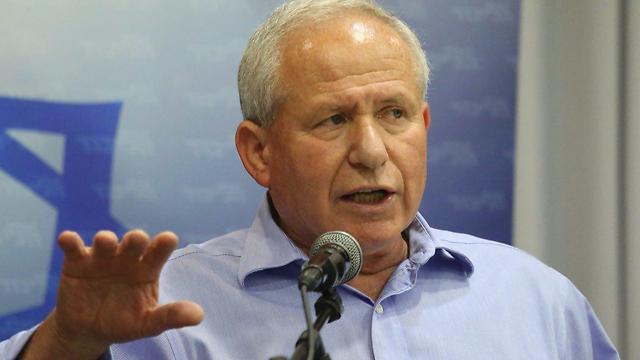
Also on the legislative agenda is promoting the long-delayed "Basic Law: Israel as the Nation-State of the Jewish People". This past May, the Ministerial Committee for Legislation approved a draft by MK Avi Dichter (Likud). However, following said approval, Shaked and Tourism Minister Yariv Levin (Likud) announced the creation of a committee chaired by MK Amir Ohana (Likud), which will be tasked with submitting an agreed-upon draft to the Knesset.
The originally approved draft lists the State of Israel as the "national homeland of the Jewish people" and declares that "the right to realizing self-determination within the State of Israel is unique to the Jewish people." The Arabic language will only have a "special status," under the new bill, rather than being an official language, as it is today.
Coalition Chairman David Bitan (Likud) intends to propose a bill forbidding the recording of calls, even when the person recording is participating in the call. This bill has been said to be an attempt by Netanyahu—with Bitan acting as his proxy—to hamstring the media in carrying out its duties and diminishing its ability to publish information.
Israel's right-wing wishes to pass another bill during the coming session, one by MK Shuli Mualem (Bayit Yehudi) in collaboration with Bitan, rolling back the Gaza Disengagement Plan in the northern West Bank, a notion originally floated by Chairman of the Shomron Regional Council Yossi Dagan.
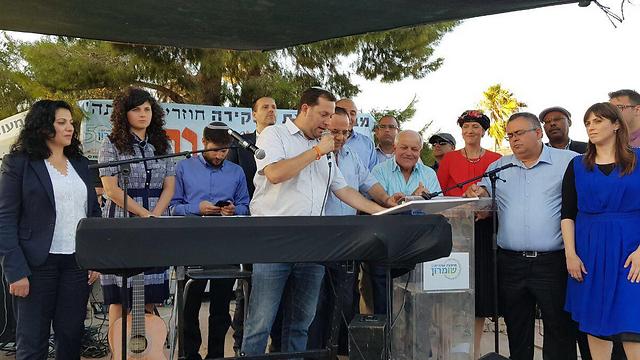
The bill's co-writers wish to permit Israeli citizens to enter the territory of former evicted Israeli settlements Ganim, Kadim, Homesh and Sa-Nur, evacuated in 2005, and to gradually allow settlers to return to the region.
The Israeli Public Broadcasting Corporation will once again occupy MKs during the coming session, with Kahlon announcing its budget may well be slashed in the 2019 fiscal year. In addition, coalition heads have already broached the prospect of shutting the new corporation (IPBC) down, or merely slashing its budget.
Finding himself in a particularly restricted situation is Zionist Union Chairperson Avi Gabbay, who faces an uphill battle in his quest to succeed Netanyahu as Israel's next prime minister, as he can neither make speeches nor confront Netanyahu in the Knesset, since he is not currently an MK.
While Gabbay is the head of the opposition's largest party and considers himself the alternative to Netanyahu's rule, his ability to challenge the long-serving prime minister is limited compared to other hopefuls, among them Yesh Atid leader Yair Lapid.










